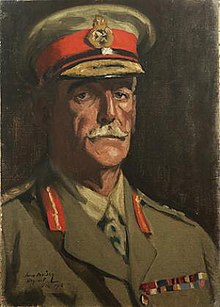Edward Bulfin
Sir Edward Stanislaus Bulfin KCB CVO (born November 6, 1862 in Rathfarnham in County Dublin (now County South Dublin ), † August 20, 1939 in Bournemouth , England ) was a British general and war hero in the First World War . He made a name for himself as an excellent leader at brigade, division and corps level and was especially recognized for his action in the First Battle of Flanders known where he assembled a small force and counterattacked to stop the German advance.
youth
Bulfin was born near Dublin, the second son of Patrick Bulfin and Teresa Clare Carroll. He went to school at Stonyhurst College and Kensington Public School. Although he was studying at Trinity College , he did not graduate from that degree but opted for a military career.
Military career
In 1884 Bulfin was assigned to the Princess of Wales's Own (Yorkshire) Regiment after serving in the Royal Irish Fusiliers militia. Shortly before he was assigned to South Africa, he married Mary Frances Lonergan in 1898, with whom he later had two children. His career made no further progress until the Second Boer War , in which he was promoted to Major of the 1st (Guards) Brigade under Lord Methuen . He took part in several skirmishes, but gave up his regimental career for a staff career when he returned to England. From 1902 to 1904 he served as assistant to the deputy general adjutant at the I Corps and from 1906 to 1910 as assistant adjutant and later supply officer of the Cape Colony . After returning to Great Britain he was promoted to colonel and surprisingly received command of the Essex Regiment, although he had never commanded a battalion. In 1913 he was promoted again and entrusted with the command of the 2nd Infantry Brigade.
First World War
Western front
When World War I broke out, Bulfin and the 2nd Brigade, part of the original British Expeditionary Force , were sent to the Western Front. At the beginning of the fighting for Ypres ( First Battle of Flanders ) at the end of October 1914, under high pressure, since no further troops were available, he quickly formed a small force of six battalions (later known as "Bulfin's force") ) and led them in a counterattack to stop the German advance. He not only managed that, but even pushed the enemy troops back by about 1 km. This act was praised as a masterpiece by both the commander of the I. Corps Douglas Haig and the commander of the BEF (" British Expeditionary Force "), John French . In December 1914 he was appointed commander of the newly formed 28th Division and led this formation through the heavy German poison gas attacks during the Second Battle of Flanders , the Battle of Height 60 and the Battle of Loos . In October 1915 Bulfin fell ill and spent the first half of 1916 convalescing in England. Thereby he escaped a transfer to the Balkan front. In June 1916 he returned to the Western Front and took command of the 60th (2 / 2nd London) Division during the Battle of the Somme , although this did not play a major role.
Thessaloniki and Palestine
In December 1916, the 60th Division was commanded to the Balkan Front , although it only stayed six months and did not take part in the more serious fighting. After Bulfins transfer to Palestine in June 1917 he was promoted to lieutenant general and with the command of the XXI. Corps entrusted. He proved to be a very capable corps commander and led his formation through the Ottoman defenses in the third battle for Gaza , paving the way for the conquest of Jerusalem. He later commanded the corps in the overwhelming victory in the Battle of Palestine .
post war period
After the Armistice of Compiègne , Bulfin remained in the military with various staff positions until he finally retired in 1926. He died in his home in Boscobe, England, in 1939.
swell
- Edward Bulfin at First World War.com
- Edward Bulfin at the "Birmingham Center for First World War Studies"
| personal data | |
|---|---|
| SURNAME | Bulfin, Edward |
| ALTERNATIVE NAMES | Bulfin, Sir Edward Stanislaus |
| BRIEF DESCRIPTION | British general |
| DATE OF BIRTH | November 6, 1862 |
| PLACE OF BIRTH | Rathfarnham , South Dublin |
| DATE OF DEATH | August 20, 1939 |
| Place of death | Bournemouth , England |

